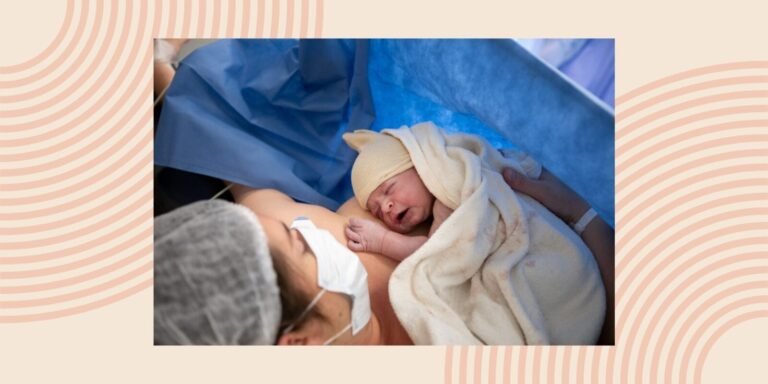Bringing a baby home changes everything about sleep. For moms recovering from C-sections, those first few nights can feel especially complicated—balancing a healing body, caring for a newborn, and the kind of exhaustion that seeps through every part of the day. A new study helps confirm what many moms have felt: C-section recovery affects sleep in different ways, and mothers deserve care that reflects the reality of this treatment.
What research reveals about the link between caesarean section, pain and sleepless nights
C-section mothers often describe the first few weeks after giving birth as a conflict between surgical recovery and the incessant needs of a newborn. At ANESTHESIOLOGY 2025 annual meeting, researchers found that mothers who deliver by cesarean section are significantly more likely to experience severe pain that interferes with sleep and daily activities and are also more likely to develop sleep disorders in the following months.
“Sleep is often overlooked in postpartum recovery, but it is central to physical and mental health», said Dr. Moe Takenoshita, lead author of the study and a postdoctoral fellow in the Department of Anesthesiology at Stanford University Center for Academic Medicine, said in a press release from the American Society of Anesthesiologists.
“Caesarean section in particular appears to increase the risk of severe pain and sleep disturbances, which can lead to postnatal depression, thinking and memory problems and fatigue, as well as disrupting bonding with their babies and relationships with family and friends.”
Related: C-section barre: My body may be different—but it’s stronger than ever
Inside the findings: how pain and sleep are connected after birth
According to the American Society of Anesthesiologistsresearchers looked at the relationship between delivery method, pain and sleep quality. In interviews with 41 new mothers, more than two-thirds of those who had C-sections—73% of planned C-sections and 67% of unplanned C-sections—reported severe pain that interrupted their sleep and daily life, compared with just 8% of mothers who had vaginal births.
When the team extended their analysis to a national insurance database of more than 1.5 million mothers who gave birth between 2008 and 2021, they found that those who had a C-section were 16% more likely to be diagnosed with a new sleep disorder such as insomnia, sleep deprivation or obstructive sleep apnea during the first year after delivery, compared to those who gave birth vaginally.
The hidden burden of treatment: what cesarean recovery really asks of mothers
Ask any mom who’s been through it and they’ll tell you: C-section recovery is serious surgery layered with the relentless care of a newborn. It is a process that tests both the body and the mind.
The findings reveal how complex this recovery really is and how postpartum care in the US often fails to meet the needs of mothers, especially regarding pain management and sleep. Too many women are discharged within days of surgery and left to heal with little monitoring or guidance.
Dr. Takenoshita emphasized that effective pain management is vital, not only for physical comfort but also for sleep and emotional well-being. “New mothers, especially those recovering from a C-section, should take care to manage their pain adequately, as untreated pain can impair sleep.” she said.
Stronger systems of care—better discharge education, routine follow-up visits, and accessible pain management resources—could reduce the physical and emotional costs of recovery.
Small changes that can help your body heal and your mind rest
While recovery looks different for everyone, small lifestyle adjustments can make a real difference. The study authors recommend strategies such as gentle movement after a doctor’s approval, resting when the baby is resting, limiting caffeine and alcohol later in the day, and establishing a calm bedtime routine with deep breathing or a warm bath.
“About a third of births in the US are by cesarean” Dr. Takenoshita added. “Those planning a C-section should understand that the procedure is associated with more severe pain after delivery and a higher risk of sleep disturbances. Anyone who has sleep problems during pregnancy or after delivery should discuss their concerns with their doctor, who can assess the issue, make recommendations and refer them to a specialist if necessary.”
Maternal health advocates continue to call for more comprehensive postpartum care so that mothers are not left to recover on their own. No one should heal without help.
Related: Viral TikTok Shows All the Layers a C-Section Must Go Through—And How They’re Cut
Give yourself permission to heal completely
If you’re reading this bleary-eyed after another long night, know this: you’re not failing. You are recovering from one of the most demanding medical procedures there is while caring for someone who depends entirely on you. This work deserves compassion, understanding, and meaningful support—from loved ones, care teams, and communities.
Rest is essential to healing, and mothers deserve the time, care, and systems that make a full recovery possible.
Source:
- American Society of Anesthesiologists. 2025 “Caesarean section linked to higher risk of pain and sleep problems after delivery.”
